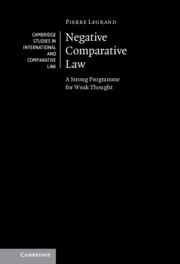Book contents
- Negative Comparative Law
- Cambridge Studies in International and Comparative Law: 167
- Negative Comparative Law
- Copyright page
- Dedication
- Epigraph
- Discontents
- I Raising My Game – To Fail Better
- II Sniffing the Wind
- III Onomastics, Very Briefly
- IV More Comparative Law
- V Borges’s Challenge
- VI Outings
- VII For Indiscipline
- VIII Decoloniality
- IX The Same as the Different
- X Comparatism Is Culturalism
- XI This Comparatist, Even
- XII The Negative
- XIII The Negative, Applied
- XIV My Equipment
- XV Appreciation
- Supplement
- Index of Matters
- Index of Names
- Cambridge Studies in International and Comparative Law
XI - This Comparatist, Even
Published online by Cambridge University Press: 02 June 2022
- Negative Comparative Law
- Cambridge Studies in International and Comparative Law: 167
- Negative Comparative Law
- Copyright page
- Dedication
- Epigraph
- Discontents
- I Raising My Game – To Fail Better
- II Sniffing the Wind
- III Onomastics, Very Briefly
- IV More Comparative Law
- V Borges’s Challenge
- VI Outings
- VII For Indiscipline
- VIII Decoloniality
- IX The Same as the Different
- X Comparatism Is Culturalism
- XI This Comparatist, Even
- XII The Negative
- XIII The Negative, Applied
- XIV My Equipment
- XV Appreciation
- Supplement
- Index of Matters
- Index of Names
- Cambridge Studies in International and Comparative Law
Summary
This fragment’s argument refutes leading theoretical assumptions informing comparative law to the effect that comparatism can be objective and access truth, on one hand, and that it must be objective and access truth, on the other. Through a biographical sketch, this argument shows that there cannot be a comparison that is not informed by the comparatist’s predispositions and predilections, themselves having much to do with the cultural world that the comparatist embodies.
Information
- Type
- Chapter
- Information
- Negative Comparative LawA Strong Programme for Weak Thought, pp. 315 - 369Publisher: Cambridge University PressPrint publication year: 2022
